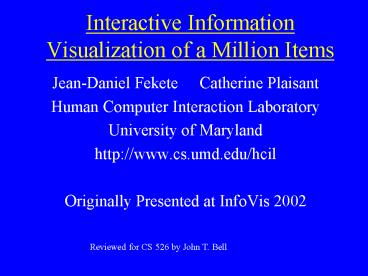Interactive Information Visualization of a Million Items - PowerPoint PPT Presentation
Title:
Interactive Information Visualization of a Million Items
Description:
Interactive Information Visualization of a Million Items Jean-Daniel Fekete Catherine Plaisant Human Computer Interaction Laboratory University of Maryland – PowerPoint PPT presentation
Number of Views:197
Avg rating:3.0/5.0
Title: Interactive Information Visualization of a Million Items
1
Interactive Information Visualization of a
Million Items
- Jean-Daniel Fekete Catherine Plaisant
- Human Computer Interaction Laboratory
- University of Maryland
- http//www.cs.umd.edu/hcil
- Originally Presented at InfoVis 2002
Reviewed for CS 526 by John T. Bell
2
Project Goals
- To display very large numbers of data items
- Each item to be displayed as a separate atomic
object, not aggregated. - Visualization to be cognitively perceptual.
- Provide continuous interaction and smooth
animation when changing viewing parameters or
view types.
3
Classic Visualization Techniques
- Overlapping Space-Filling(
Scatter Plot ) ( Treemap )
4
TreeMap of a Million Items
5
TreeMap of a UNIX Filesystem
6
Human PerceptionPre-Attentive Graphical Features
- Nelson
- Johnson
- Yu
- Buy
- Bush
- Bell
- Theys, M.
- Theys, C.
7
Pre-Attentive Features ( Healy 11 )
- binocular luster
- stereo depth
- 3D depth cues
- lighting direction
- orientation
- length
- width
- size
- curvature
- number
- terminators
- intersection
- closure
- color (hue)
- intensity
- flicker
- direction of motion
8
Interactive Techniques ( Ahlberg 1 )
- Overview, zoom in, filter, details
- Display query results
- Rapid, incremental, reversible control
- Selection by pointing, not typing
- Immediate continuous feedback
- Techniques for large data sets include space
time multiplexing space deformations (
aggregation, sampling, LOD )
9
Technical Constraints
- 1600 x 1200 displays -gt 1.92 Million pixels
- Refresh rate of 10 fps requires special
techniques. ( Graphics cards at 15M tps,
achievable in practice only with ? strips. ) - This work done with NVidia GeForce3 cards, 2GHz
computers, OpenGL - Interactive speeds achieved by cleverly
offloading rendering tasks to the GPU
10
Individual Item Display
- Items displayed as shaded quads, w/o borders
- Information attributes include size, position,
color ( categorical or value based ), and
intensity ( value based ) - Color indicated using one-dimensional texture
indexes. ( One byte per vertex, not 3 or 4 ) - Data per vertex X, Y, Z, and S ( text. Index )
11
Illustration of Shaded Rectangles
12
Synthetic Overlap
- Stencil Buffer can be accessed to determine
overlap counts and/or filtering accordingly
13
Transparency Stereo Vision
- Transparency can be useful in overlap situations,
BUT it interferes with pre-attentive processing
by blending colors. - Therefore only useful when dynamically adjustable
for exploring overlap information. - Stereo vision also of limited usefulness with
overlap exploration, for the same reasons.
14
Animation and Interaction
- Data exploration often involves changing views -
This can cause problems correlating information
in different views. - Flipping can be used when geometry is fixed.
- Linear interpolation works when layout fixed.
- Otherwise interpolate in two stages Postion
first, then size. ( Treemaps can be squarified or
slice-and-dice. ) - Texture maps can speed up the process, by warping
a square area as a whole unit.
15
Animation of Property Changes
16
Animating View Changes
17
Implementing Dynamic Queries
- Used to dynamically filter the data based on a
range of values for a particular attribute. - Items are stored as display lists on the GPU
- Z-coordinate is mapped to changing attribute
- Near and far clipping planes are adjusted based
on slider values, and the GPU solves the problem
of which items to display. - For PCs with limited video RAM, use OpenGL points
of varying sizes instead of quads ( NVidia Vertex
programs extension. )
18
Performance
- 23,000 lines of C, reads XML or directory
- NVidia GeForce 3 on 2GHz Pentium and 3Dlab
Wildcat 5110 on dual 1.7 GHz Pentium - Sustainable performance 2.5 M Quads / sec
- 10 fps treemap animations for any treemap,
through the use of texture maps. - 3 / 6 fps scatterplots, for animations / queries.
19
Conclusions Future Work
- 1M items have been displayed on 1600x1200,
interactively without aggregation. - New techniques have been developed to take
advantage of modern GPU capabilities. - Future data explorations include U MD catalog and
circulation data and U.S. Census data, involving
domain experts in user testing.
20
Web Site, Downloads, Movies
- Http//www.cs.umd.edu/hcil/millionvis
21
References - General
- Jean-Daniel Fekete Catherine Plaisant,
Interacive Information Visualization of a
Million Items, InfoVis 2002. - 1 Ahlberg et al., Visual Information Seeking
Tight Coupling of Dynamic Query Filters with
Starfield Display, Human Factors in Computing
Systems, 1994. - 11 Healy et al., Visualizing Real-Time
Multivariate Data using Preattentive Processing,
ACM Transactions on Modeling and Computer
Simulation, 1995.
22
References - Treemaps
- 4 Bederson et al., Ordered and Quantum
Treemaps Making Effective Use of 2D Space to
Display Hierarchies, ACM Transactions on
Computer Graphics. - 13 Johnson et al., Tree-maps A Space-Filling
Approach to the Visualization of Hierarchical
Information Structures, IEEE Visualization 91.































